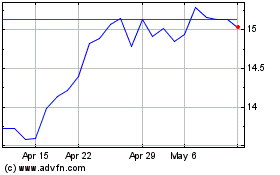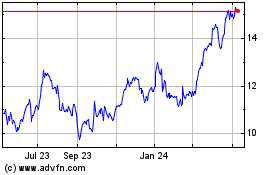By Jenny Strasburg
Deutsche Bank AG reported a EUR3.15 billion ($3.51 billion) net
loss in the second quarter, reflecting the pain of a global revamp
and a large restructuring charge that wiped out what would have
been a modest profit.
Germany's biggest bank, which is in a prolonged struggle to
stabilize its business, said it booked a EUR3.4 billion
restructuring charge in the quarter, higher than the EUR3 billion
it previously expected. Excluding the charge, second-quarter profit
was EUR231 million, slightly higher than its preliminary estimate
earlier this month when it revealed its reorganization plans.
Shares in the lender were trading 5% lower in Frankfurt on
Wednesday morning, at around EUR6.77, before recovering
partially.
Executives at the German bank say a sweeping overhaul will pay
off in coming years through a leaner, more focused lender. The bank
said it expects a full-year loss and a revenue drop from 2018.
"This decline is mainly due to our decision to exit
substantially all of our equities sales and trading business," the
bank said in a statement.
Deutsche Bank is curtailing its global ambitions through plans
to cut 18,000 jobs and largely retreat to its core European market.
For years, the lender experienced difficulties competing in core
trading businesses, deal advising and other areas where European
banks have fallen behind stronger American rivals.
The bank's challenges are exacerbated by legal and compliance
woes and a low-margin retail market in Germany. Chronically low or
negative interest rates have weighed heavily on continental
lenders.
Last quarter's sharp drop in trading revenue -- down 12% across
the securities business -- and lower deal-advisory fees contributed
to a EUR900 million pretax loss in the investment bank. All but
EUR97 million of that loss came from restructuring charges.
Executives said a substantial part of the revenue declines were a
natural result of the bank's narrowing scope of business. Analysts
say investors need convincing.
"Excluding transformation charges the bank would be profitable,
and in our more stable businesses revenues were flat or growing,"
Chief Executive Christian Sewing said in a statement Wednesday.
Still, the transaction-banking unit that finances clients' trade
flows and manages companies' cash, where Deutsche Bank is spending
money to expand, had a disappointingly flat quarter. Its revenue
was unchanged when accounting for a one-time boost a year earlier,
far from the lofty revenue increases the bank said it would
deliver.
Deutsche Bank said the big second-quarter charge will help
position it for growth because it represents a "substantial
portion" of the total costs expected from its multiyear
restructuring. Through 2022, the restructuring will cost a total of
about EUR7.4 billion, Deutsche Bank said this month.
As layoffs mount, severance expenses will too. Analysts say
Deutsche Bank faces a difficult challenge balancing cost-cutting
with the high price of the overhaul, which will strain its capital
cushion. Executives say they believe they can shoulder those costs
without asking shareholders to pony up more cash.
The bank posted EUR6.2 billion in net revenue in the second
quarter, slightly lower than the EUR6.3 billion average expected by
analysts and down 6% from a year earlier. Investment-banking
revenue fell 18% from a year earlier, while revenue at the smaller
asset-management unit rose 6%. In the retail banking division,
which includes the private-banking business, revenue fell 2%.
The restructuring has led to both planned and unplanned
departures across businesses, which started well before the bank's
formal unveiling of its reorganization. More than 900 people have
received notice they are being fired or their jobs are being cut,
the bank said Wednesday.
The bank has reorganized its management under Mr. Sewing.
Several top executives, including the head of the investment bank,
are leaving and the CEO is taking over supervision of that
division, which is the bank's most important revenue engine.
The lender created a so-called bad-bank division, called the
Capital Release Unit, to sell or wind down nearly EUR300 billion in
assets including derivatives contracts that can't be disposed of
easily. The process is expected to take several years.
As part of the shrinkage, Deutsche Bank is dismantling chunks of
its Wall Street operations, built over more than 20 years. It is
peddling portfolios of equity derivatives and other holdings to
rival banks and said it is on track to sell big portions of an
electronic-trading and prime-brokerage business serving hedge funds
to BNP Paribas SA.
Calling the moves a "fundamental rebuilding of Deutsche Bank,"
Mr. Sewing promised to shed businesses where the lender has failed
to compete, including equities trading. Investors have called for
the bank to lop off money-losing operations after years of
persistent share declines and strategic rethinking.
Earlier and shallower cuts failed to stabilize profits for the
149-year-old lender. In April, talks with smaller German rival
Commerzbank AG ended without a deal, raising fresh questions about
Deutsche Bank's direction.
--Pietro Lombardi contributed to this article.
Write to Jenny Strasburg at jenny.strasburg@wsj.com
(END) Dow Jones Newswires
July 24, 2019 05:56 ET (09:56 GMT)
Copyright (c) 2019 Dow Jones & Company, Inc.
Commerzbank (PK) (USOTC:CRZBY)
Historical Stock Chart
From Jan 2025 to Feb 2025

Commerzbank (PK) (USOTC:CRZBY)
Historical Stock Chart
From Feb 2024 to Feb 2025
